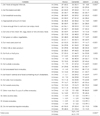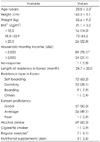1. Ministry of Justice (KR). Immigration service statistics 2011. 2011. Gwacheon: Ministry of Justice, IT Planning & Statistics Team.
2. Lim C. Acculturative stresses and adjustment elements of Chinese students' studying in Korea. Korean J Hum Ecol. 2009; 18(1):93–112.

3. Kim JM, Lee NH. Analysis of the dietary life of immigrant women from multicultural families in the Daegu area. J Korean Diet Assoc. 2009; 15(4):405–418.
4. Lim KL, Kim HK. A prediction model on adaptation to university life among Chinese international students in Korea. J Korean Acad Soc Nurs Educ. 2011; 17(3):503–515.
5. He J, Klag MJ, Wu Z, Qian MC, Chen JY, Mo PS, He QO, Whelton PK. Effect of migration and related environmental changes on serum lipid levels in southwestern Chinese men. Am J Epidemiol. 1996; 144(9):839–848.

6. Lv N, Cason KL. Dietary pattern change and acculturation of Chinese Americans in Pennsylvania. J Am Diet Assoc. 2004; 104(5):771–778.

7. Lee BK, Lee JH. Evaluation of dietary variety by food habits in female university students. Korean J Food Nutr. 2011; 24(4):687–701.

8. Li Q, Song YW. Analysis of dietary and nutritional status of the students from three colleges in Qinghai province. Chin J School Health. 2005; 26(2):1023–1024.
9. Bae YJ, Kim MH, Yeon JY. Evaluation of dietary zinc, copper, manganese and selenium intake in female university students. Korean J Community Nutr. 2012; 17(2):146–155.

10. Park JH, Jung JH, Kim HS. Study on dietary habits of college women according to the residence type in Seoul. J Korean Diet Assoc. 2011; 17(4):335–348.
11. Kim SH, Kim HY, Lyu JE, Chung HW, Hwang JY. Dietary intakes and eating behaviors of Vietnamese female immigrants to Korea through marriage and Korean spouses and correlations of their diets. Korean J Community Nutr. 2009; 14(1):22–30.
12. Korean Nutrition Society. Dietary reference intakes for Koreans, 1st revision. 2010. Seoul: Korean Nutrition Society.
13. Story M, Harris LJ. Food preferences, beliefs, and practices of Southeast Asian refugee adolescents. J Sch Health. 1988; 58(7):273–276.

14. Sakamaki R, Toyama K, Amamoto R, Liu CJ, Shinfuku N. Nutritional knowledge, food habits and health attitude of Chinese university students--a cross sectional study. Nutr J. 2005; 4:4.
15. Kim MH, Lee JC, Bae YJ, Cho HK, Kim MH, Kim EY, Hong WJ, Sung CJ. Nutritional status and diet quality of female college students by living together with or without parents. J East Asian Soc Diet Life. 2006; 16(6):635–645.
16. Choe JY, Cho MS. Investigation of dietary behaviors according to residence status and ethnicity of university students in Yanbian, China. Korean J Food Cult. 2012; 27(1):38–48.

17. Yim KS. Analysis of nutritional status of Korean-Chinese residing in Korea. Korean J Health Promot Dis Prev. 2006; 6(1):9–19.
18. Choi KS, Shin KO, Huh SM, Chung KH. Comparison of nutritional and physical status according to the residental type among college women in Seoul Women's University and Sahmyook University. Korean J Nutr. 2010; 43(1):86–96.

19. Chang YK, Oh EJ, Sun YS. A study on the food habit & the health responses of college students to the today health index. J Korean Home Econ Assoc. 1988; 26(3):43–51.
20. Choi MK, Jun YS, Park MK. A study on eating patterns and nutrient intakes of college students by residences of self-boarding and home with parents in Chungnam. J Korean Diet Assoc. 2000; 6(1):9–16.
21. Gritz ER, Bastani R. Cancer prevention--behavior changes: the short and the long of it. Prev Med. 1993; 22(5):676–688.
22. Kim KN, Lee KS. Nutrition knowledge, dietary attitudes, and food behaviors of college students. Korean J Community Nutr. 1996; 1(1):89–99.
23. Kim H, Han SN, Song K, Lee H. Lifestyle, dietary habits and consumption pattern of male university students according to the frequency of commercial beverage consumptions. Nutr Res Pract. 2011; 5(2):124–131.

24. Kim HK, Kim JH. Food habits and nutrition knowledge of college students. J Korean Soc Food Sci Nutr. 2005; 34(9):1388–1397.






 PDF
PDF ePub
ePub Citation
Citation Print
Print





 XML Download
XML Download